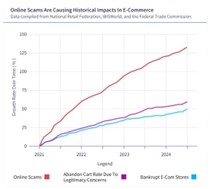As the share of e-commerce grows in the global trading mix, so does the prevalence of online scams and frauds. The distrust of the shoppers is growing.
Sometimes it is just the irresponsibility and carelessness on the part of the online store and sometimes it is the error of the shopper in ordering not exactly the thing they want to buy. Nevertheless, this also adds to the wariness of the online shoppers.
The stakeholders in Central Asia need to join hands and prevent the loss to the customers. There has to be a responsive body to address the complaints of the shoppers.
We are reproducing here a report issued by TrulyLegit Inc. The report was distributed by the Newsfile Corp:
E-Commerce in Crisis: New Data Reveals How Shopper Distrust is Shaping Online Retail
28% of Sales Lost Due to Site Legitimacy Concerns, According to New Research
E-commerce businesses are grappling with a significant challenge, facing an estimated 28% loss in sales due to shopper uncertainty about the legitimacy of online retailers. This alarming statistic comes from a groundbreaking study conducted in collaboration with Truly Legit, the National Retail Federation, IBISWorld, and the Federal Trade Commission.
The research highlights the escalating rise of online scams and their unforeseen consequences on the e-commerce sector. As consumer trust diminishes, the effects are profound, impacting E-Commerce businesses globally.
Key Findings from the Study Include:
Truly Legit’s Impact: What sparked this study was Truly Legit showing their team data from their most recent case studies, proving that businesses displaying verification badges see conversion increases of up to 26%. Truly Legit took this as a key indicator that shopper fraud fear has a much larger impact on conversions than anticipated.
Rising Online Scams: According to the Federal Trade Commission, reported scams have surged over 130% since 2021, now affecting 1 in 2 consumers and significantly altering shopping behaviors.
Cart Abandonment Rates: An analysis of heatmaps from over $1 billion in abandoned transactions across 14,000 e-commerce stores shows that “fraud fear” directly correlates with rising abandonment rates. The payment groups involved in this study conducted several A/B tests with their merchants, analyzing the differences in conversions after e-commerce stores displayed their legitimacy. Their research found that an estimated 28% of online purchases are abandoned due to uncertainty about a site’s legitimacy.
Business Viability: The fear of online scams is believed to be contributing to a rising number of failed e-commerce businesses in 2024, underscoring the urgent need for solutions that enhance consumer trust.
Dependence on Legitimacy: As reviews become less credible, consumers increasingly trust verification badges. Just like social media platforms offer creators a way to get verified, there is a way for online retail stores to achieve verification. With only one solution available, Truly Legit has revolutionized the online commerce space, allowing businesses to get verified and showcase their legitimacy.
This rising problem is being addressed by reputable sources, including industry experts and market analysts, who emphasize the importance of building trust in e-commerce. As Dan Schawbel, a New York Times bestselling author and Managing Partner of Workplace Intelligence, points out:
“Trust is the new currency in the e-commerce world. If companies want to thrive, they need to build genuine relationships with their customers and ensure their online security.”
Conclusion:
This exclusive data underscores a vital call to action for e-commerce retailers: prioritizing legitimacy and transparency is essential for survival and growth in an increasingly risky online environment. /// nCa, 27 September 2024

